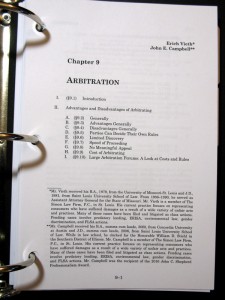I know that this is a shameless self-promotion, but here goes. I’ve often ranted about the way unscrupulous businesses take advantage of consumers by inserting horrendously unfair mandatory  arbitration clauses in their contracts. A new Missouri CLE Deskbook for lawyers was released yesterday and it features a highly detailed chapter on arbitration clauses. I was one of two co-authors, along with John Campbell with whom I have the honor of working at the Simon Law Firm in St. Louis, Missouri.
arbitration clauses in their contracts. A new Missouri CLE Deskbook for lawyers was released yesterday and it features a highly detailed chapter on arbitration clauses. I was one of two co-authors, along with John Campbell with whom I have the honor of working at the Simon Law Firm in St. Louis, Missouri.
This manual is geared to help Missouri consumer lawyers, but it could be valuable for anyone who wants to know the state of the law of consumer arbitration. It worth noting that Missouri law has paralleled the arbitration law of many other states, especially on the issue of unconscionability (John and I argued for the winning side of the August 31, 2010 case decided by the Missouri Supreme Court, Brewer v. Missouri Title Loans).
If you are interested in taking a look at this chapter, I would assume that you will soon be able to find this book in most law libraries and on the library shelves of many law firms.
For a glimpse of how complicated this topic of arbitration has gotten, I’m printing out the Table of Contents below:
ARBITRATION
I. (§9.1) Introduction
II. Advantages and Disadvantages of Arbitrating
A. (§9.2) Generally
B. (§9.3) Advantages Generally
C. (§9.4) Disadvantages Generally
D. (§9.5) Parties Can Decide Their Own Rules
E. (§9.6) Limited Discovery
F. (§9.7) Speed of Proceeding
G. (§9.8) No Meaningful Appeal
H. (§9.9) Cost of Arbitrating
I. (§9.10) Large Arbitration Forums: A Look at Costs and Rules
III. History of Mandatory Arbitration
A. (§9.11) Arbitration Comes Into Vogue
B. (§9.12) Proliferation of Arbitration Agreements
C. (§9.13) Pendulum Swings Back to Scrutiny of Arbitration Clauses
D. (§9.14) Special Case of Class Arbitration
IV. (§9.15) Duty to Arbitrate
A. (§9.16) Judicial Construction of Arbitration Provisions
B. (§9.17) Nonsignatory Parties
C. (§9.18) Insurance Contracts
D. (§9.19) Relationship Between Broadly Written Arbitration Provision and Related Tort Claims
E. (§9.20) Internet Browsewraps Can Be Enforceable
F. (§9.21) Rights of Assignees and Holders
G. (§9.22) Nursing Home Cases: Family Members Are Not Automatically Bound by Arbitration Agreements Pertaining to Residents
V. Enforcing and Contesting Purported Agreements to Arbitrate
A. (§9.23) Generally
B. (§9.24) Unconscionability
1. (§9.25) Procedural and Substantive Unconscionability
2. (§9.26) Specific Issues That May Be Raised to Prove Unconscionability
a. (§9.27) Inconvenient Venue
b. (§9.28) Excessive Fees and Costs
c. (§9.29) Non-Mutuality of Terms
d. (§9.30) Limitations on Damages or Attorney Fees
e. (§9.31) Severe Limitations on Discovery
f. (§9.32) Loser Pays Rule
g. (§9.33) Unilateral Right to Select Arbitrator or Arbitration Forum
h. (§9.34) Class Waivers—A Special Case of Unconscionability
(1) (§9.35) Whitney v. Alltel Communications, Inc.
(2) (§9.36) Woods v. QC Financial Services, Inc.
i. (§9.37) Decisions in Federal Court
C. (§9.38) Duress and Fraud
D. (§9.39) Waiver
E. (§9.40) Lack of Consideration or Consent
F. (§9.41) Laches and Equitable Estoppel
G. (§9.42) Running of the Applicable Statute of Limitations
H. (§9.43) Exculpatory Clause Requirements
I. (§9.44) Special Challenges to Arbitration Clauses—Title Loans
J. (§9.45) Contesting Arbitration—Practical Tips and Other Considerations
1. (§9.46) Pitfalls
2. (§9.47) Procedural Mechanisms for Challenging an Arbitration Clause
K. (§9.48) A Few Tips for Defeating a Motion to Compel Arbitration
1. (§9.49) Get Discovery
2. (§9.50) Insist on an Evidentiary Hearing
L. (§9.51) Severability
VI. (§9.52) Confirmation or Vacation of Arbitration Awards
A. (§9.53) Missouri Cases Setting Forth the Limited Scope of Judicial Review of Arbitration Awards
B. (§9.54) Arbitrator Acting Beyond the Arbitration Agreement
C. (§9.55) Manifest Disregard of the Law
D. (§9.56) Waiving the Right to Judicial Review of an Arbitration Award
VII. (§9.57) Appeal of Trial Court Rulings Regarding Motions to Compel Arbitration
VIII. (§9.58) Conclusion

